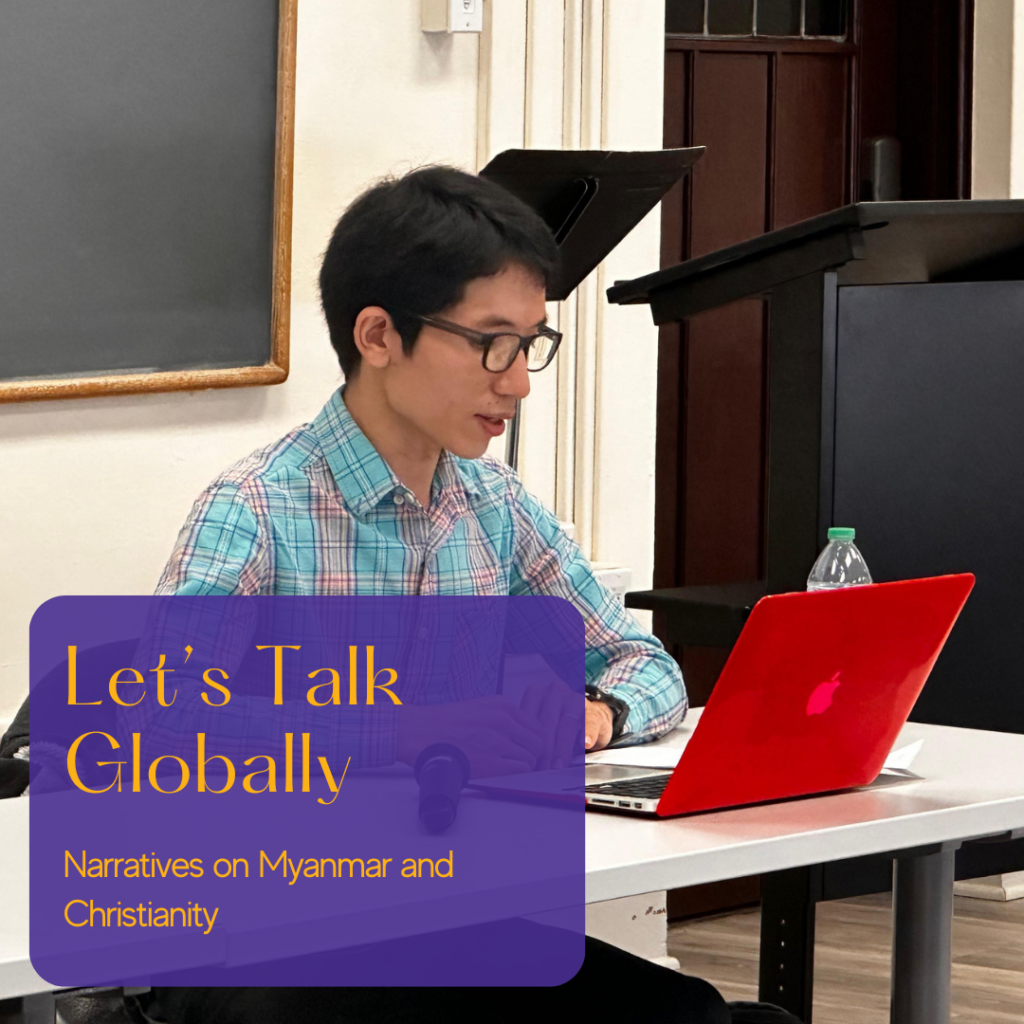Bearing Witness to Burma
April 30, 2024

Every month, Garrett-Evangelical international students host a luncheon, “Let’s Talk Globally,” where they educate the rest of campus (and alumni who watch online) about pressing theological and humanitarian issues in their home country. Students from Myanmar led the March convening, offering witness to the atrocities suffered in the ongoing civil war. Bringing in two Burmese experts, Rev. Dr. Khen Chum (GETS alum 2023 and Associate Professor of New Testament at Chin Christian University in Burma) and Dr. Lama Htoi San Lu (a Lily Teaching Fellow at Hartford International University), their talk on the “Burmese Church’s Response on the Military Coup Today,” sought to situate current actions by Burmese Christians within broader history of the region.
While Myanmar* gained independence from the British Empire in 1948, Dr. Chum outlined how newly won freedom soon shifted into military control. Aung San, heralded by many as the “Father of Burmese Independence,” worked tirelessly throughout his life to end the British occupation. Tragically, he was assassinated in 1947 in the transition to independent rule, and the ensuing government never implemented the plans he envisioned. “The period from 1948 to 1962 was marked by growing political instability and several wars between armed ethnic groups who used this instability to arrest, imprison, and torture many political activists and civilians,” Chum noted, “then Burma was ruled by a brutal military regime.”
In 2015, Burma held the first democratic election without military interference in more than fifty years, and the National League for Democracy won in a landslide, ending the junta’s control. Unfortunately, just six years later, the military orchestrated a coup, overthrowing the elected government. Since then, Chum says, “the military has killed thousands of innocent civilians, and burned thousands of houses, churches, and schools,” in a reign of terror designed to suppress any resistance.
Into this broader history, Dr. Lama Htoi San Lu testified in devastating detail how violence impacts the people, and the theoethical dimensions of how the Church should respond. She told the story of a young woman, pseudonymously named Marip Lu, “who was drugged, kidnapped, trafficked and captured by a Chinese family in the Henan province of China.” For six years, Marip Lu was held captive, until she fled back to northern Burma where she was reunited with family, “leaving behind her three-year-old son she was forced to birth and raise after being repeatedly raped and abused.” Dr. Lama made clear this is not an isolated story, “The local women’s activists who helped Marip Lu escape say there are hundreds of women who have had similar, brutal experiences.”
While Dr. Lama is glad to see more churches participating in efforts for political freedom, she wishes the experience of Marip Lu would “change how we imagine and understand liberation movements.” Churches, she says, solely focus on freedom from military rule. “I am more interested in a liberation movement that understands and takes serious the intersection of race, ethnicity, class, gender, sexuality and religion,” she confesses, “Theologians like Marcella Althaus-Reid from a Latin American context, Delores Williams’ womanism in the US, Kwok Pui-Lan and many others have pointed out what some forms of liberation theology are missing.”
Into this context, she offers the Lord’s Supper as the ritual Christians should turn to when thinking about liberation. “The Eucharist is not just simply liturgical practice, it is also an active Christian resistance to militarism,” she says, drawing on Asian American feminist ethicist Keun-Joo Christine Pae’s work, “Militarism violates eucharistic theology grounded in the unity of body and the spirit in which participants are united in Christ.” When we participate in the ritual, we affirm our resistance to all that fractures this fundamental unity. “We are invited into a theological and ethical understanding of the communion,” she says, “that asks us to imagine and then embody a new world where “peace does not have a militarized faith face.” Click here to listen to Dr. Lama Htoi San Lu’s full remarks.
This theme of eucharistic conversion struck a chord with those assembled. Toward the end of the gathering, one international student described his experience working as a hotel clerk in 2012, a time before he became politically active in resistance. That hotel has now been bombed, he says—all the people who worked in it have been displaced. He’s been protesting in the streets, speaking out against “how the military has been brutally and systematically controlling the rise of human beings.” Visibly distraught, his voice trembled with emotion but persevered in power. “When you pray for Burma, and pray for us, do not pray for victory and peace, but for transformation,” he asked, “Without transformation, peace and victory cannot survive for a long time.”
* Presenters alternatively used “Myanmar” and “Burma” to refer to the country, this article will do likewise

